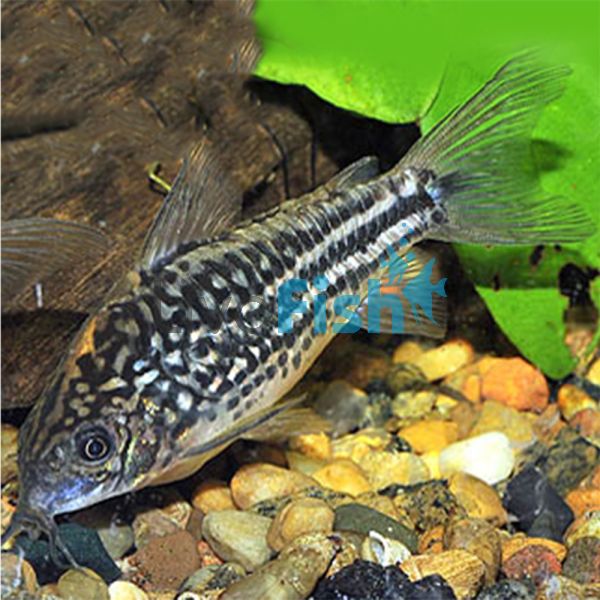Corydoras Napoensis 2.5cm
The Corydoras Napoensis is arguably one of the most beautiful and contrasting species out of all corydoras. The almost galaxy-like patterning along with how these corydora only reach a maximum of 4.5 cm they are an incredibly versatile and easy fish to care for. They are also seldom seen in the home aquarium due to their lack of awareness but will make for a great highlight bottom dweller in a community tank or a fantastic breeding project.
Napoensis Corydoras
The Corydoras Napoensis is arguably one of the most beautiful and contrasting species out of all corydoras. The almost galaxy-like patterning along with how these corydora only reach a maximum of 4.5 cm they are an incredibly versatile and easy fish to care for. They are also seldom seen in the home aquarium due to their lack of awareness but will make for a great highlight bottom dweller in a community tank or a fantastic breeding project.
Napoensis corydoras mostly have a black-and-white colour which is part of the reason they are so appealing. The stark contrast between the light and dark colours really makes these fish stand out in the aquarium whereas most Corydoras species tend to just be dark. The body colour of the Napoensis corydoras is generally a silver to white shade which is overlaid with a scribbled patterning of jet black. The way this black scribbling is on the body makes it look like an array of stars dotted across a black void which is why these fish are often also called galaxy corydoras. Above all this, they also have patches of gold near the head and belly area for some additional shimmer. Just like any other corydoras species, the Napoensis cories will constantly stir the substrate layer in order to look for food. This behaviour ensures they are keeping the substrate turned over and any debris in the water column, which can then be picked up by the aquarium filter. They are almost exclusively bottom-dwelling fish and are an awesome option to add some life to the bottom of the tank.
The Napoensis are also considered to be a schooling catfish and it would be best to keep them in a group of at least 5-6 although more than this will never hurt. Differentiating males and females is possible where the males are often smaller and narrower compared to the larger-bodied females. The best method to identify is to get a school and let a pair naturally form. Females are often triggered to spawn after being fed high-quality food and a slight reduction in the temperature. The wild origin of the Napoensis corydoras is South America.
Tank Recommendations for you Napoensis Corydoras
As Napoensis cories reach around 4.5 cm as adults it is best to keep them in an aquarium with a minimum size of around 70 litres. A larger aquarium will always be better since a larger school can be kept along with the space for other tank mates. A sand substrate is best as coarser substrates like gravel often result in corydoras damaging their barbels. They will also love plants in the aquarium and places for cover through the addition of driftwood. As these are tropical fish, it is best to maintain the temperature at around 24-26 degrees.
Suitable Tank Buddies
Napoensis corydoras is an incredibly peaceful fish that can be kept in an absolutely massive range of community aquariums. They do not display any aggression even when breeding and make for a perfect addition even with sensitive or shy fish. The obvious consideration would be to just avoid keeping anything that might harm this fish.
Usually Compatible
Angelfish, cardinal tetras, rams, discus, and similar peaceful South American species.
Sometimes Compatible
Mystus catfish, geophagus, veja cichlids, and other peaceful but potentially territorial species.
Rarely Compatible
Large and aggressive species such as the Oscars may prey on the Corydoras. This is especially important as Corydoras have spines on their pectoral fins like many catfish, this can result in both the corydoras and the predator fish’s death.
Feeding your Napoensis Corydoras
Just like any other corydoras these fish are very easy to feed. They will take a wide range of pellets, flakes, and frozen foods. Just like any fish though they should be fed a varied diet with a mix of different foods.
The ideal diet would be a good quality micro slow-sinking pellet or crushed flake, supplemented with frozen bloodworms or black worms or even live foods like baby brine shrimp or micro worms.
| Scientific Name | Corydoras napoensis |
|---|---|
| Care Level | Moderate |
| Common Names | Napoensis Corydoras, Napo Cory, Galaxy Corydoras |
| Diet | Carnivore |
| Fish Family | Callichthyidae |
| Lifespan (years) | 8 |
| Max. Length (cm) | 4.5 |
| Min. Tank Volume (l) | 70 |
| Origin | South America |
| Reef Safe | Yes |
| Sociability | Peaceful |
| Venomous | No |
| Water Conditions | 24-26° C, pH 6.0-7.0 |




